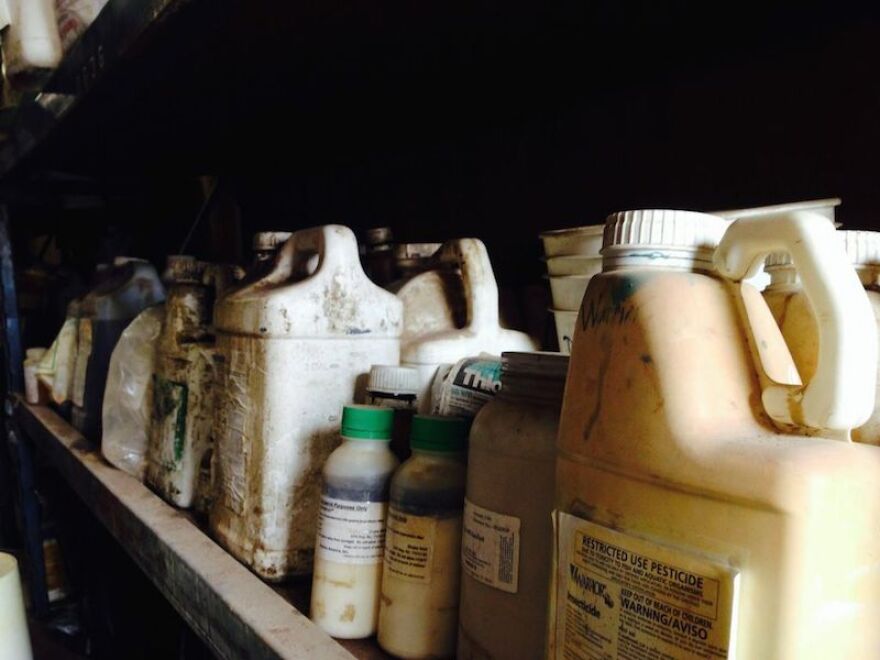Figuring out how to maximize yields on legal marijuana in Washington state will be tricky -- and not every licensed farmer will survive the competition and the tight margins.
Take Susy Wilson’s farm near Dallesport in the Columbia Gorge. Her pot crew and support includes low-paid family and friends.
And a few waist-high pot plants in her fenced-off compound look a bit sad.
“One of my partners’ girlfriend really overwatered them the other day and I’m a little concerned about some of them,” Wilson explained. “But I think we’ll be OK, we’ve got the heat coming.”
Wilson has now installed large chalkboards in her building to record watering, light cycles and temperatures.
She and other pot farmers have been sharing their mistakes and successes with each other.
“I don’t know what’s going to do well outdoors, so it’s sort of trial and error,” Wilson said. “My youngest daughter and I did all this irrigation one afternoon. I didn’t think that we’d be able to do it, but we did, and we’re so proud of it.”
‘You Can Win Big, You Can Lose Big’
To understand who is going to succeed with this new commodity, it helps to visit a more traditional farm.

Rob Davis has already met with great success in his field. He farms about 7,000 acres of potatoes over a 40-mile swath of Washington.
“You can win big, you can lose big,” Davis said.
French fry potatoes are one of the world’s most competitive, time sensitive and demanding crops.
“You’ll put more hours and more time and you’ll lose more sleep over a crop of potatoes than most other crops,” Davis explained. “But at the end of the year when it all turns out, there is no bigger reward than to know that you came out and planted one of the most difficult crops out there to plant. That you got it, you did it and you succeeded at it.”
About 20 percent of the potatoes in the United States come from the Columbia Basin. Davis wears a lot of hats to make sure his French fry crop makes money.
“You’ve got to be biologist, a chemist, a soil scientist, an accountant, an attorney, a mechanic, an electrician, a human resources manager,” he said. “You have to have all of that.”
A System Of Support
Cents on each pound of potatoes make the difference on skipping to the bank, or going bust.
The very first time you're not going to know all the secrets. You're going to figure it out over time.
Still, potato growers have had thousands of years and the best science to perfect their craft. Davis said any new farmer will be on steep learning curve and it can take years to hit the sweet-spot on yields.
“The very first time you’re not going to know all the secrets,” he said. “You’re going to figure it out over time.”
It’s not just experience though. He gets a lot of help in terms of research, marketing and politics.
There’s the Washington Potato Commission, the Washington Potato And Onion Association, Washington State University, the U.S. Potato Board, the National Potato Council and researchers from the state, region and federal government.
It’s almost like an army marching tirelessly, all for the betterment of American potatoes. But for the marijuana industry there are no support troops -- at least yet.
Some pot industry groups have started up around the state. There’s even a huge industry conference in Tacoma coming up this month. But marijuana’s status as an illegal drug under federal law means any traditional sorts of research support help is a long way off at best.
New Crop, Old Problems
And that lack of federal recognition affects tangible things. Things like pesticide approval.

“There are a lot of growers that have questions on what they should and shouldn’t be using,” the Washington State Department of Agriculture’s Erik Johansen said. He’s where the buck stops for the state’s approved pesticide list for pot.
Johansen said those pesticides have to comply with not only state but federal labeling requirements. That means Johansen must look for loopholes or pesticides with broad labeling applications.
He’s cleared 260 so far. That might sound like a lot, but for your average crop that’s pretty low.
“They are not going to meet every potential need,” Johansen said. “And if there is a pest or disease scenario that gets out of hand it’s going to be tough for them to catch up.”
Davis said even with the best pesticides and all the best farm practices, Mother Nature is a beast and stuff happens.
“The only real way to perfect it is through time and conversations among themselves,” he said. “Even one particular grower, no matter what the crop is, you’ve figured out what not to do. None of us really know exactly how to do it. But it’s what not to do.”
Davis said over time, it’s actually “the what not to do,” that educates growers. That’s ultimately what affects pocketbooks and survival.
Farming, he said, isn’t for the faint of heart.
-----
This project is a collaboration with Jordan Schrader of The News Tribune in Tacoma. Read his companion piece to this story. For more photos see our slideshow on Flickr.


